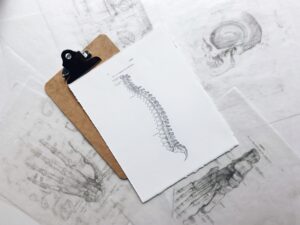For those who are not familiar with a pinched nerve, it is a painful condition that can have a profound impact on your day-to-day life. Also commonly referred to as radiculopathy, a pinched nerve occurs whenever an excessive amount of pressure is placed on any of the nerves in the body by surrounding tissues. Some of these surrounding tissues can include muscles, tendons, or even bones. It is also worth noting that many people in America have or will develop a pinched nerve of some kind in their lifetime. According to a study published by Harvard Health Publishing, the publishing arm of Harvard Medical School, over 40 percent of Americans will develop sciatica at some point in their life. For those who are not familiar with sciatica, it is a severe form of back pain that occurs when the sciatic nerve becomes pinched.
WHAT CAUSES A PINCHED NERVE?
Having established that a pinched nerve is a byproduct of muscles, tendons, or bones that place pressure on certain nerves in the body, let’s take a moment to go over some of the things that might cause this to happen. In many cases, the muscles, tendons, or bones in the body that pinch nerves do so in response to repetitive motion, such as typing or sewing, for example, which can place pressure on the median nerve that travels from the hand to the wrist. Several studies also show that a pinched nerve, which can trigger sciatica, can be caused by herniated discs. These are the rubber-like discs in-between the vertebrae and the spine.
CAN YOU HAVE A PINCHED NERVE WITHOUT EXPERIENCING PAIN?
Contrary to popular belief, a pinched nerve does not always trigger pain symptoms. However, this does not mean that those who develop the condition are symptom-free. Depending on the part of the body that is impacted, many individuals will experience swelling, scarring, and numbness. Certain parts of the body may also become noticeably weak. This is especially true for those who develop carpal tunnel syndrome as a result of a pinched nerve. So while pain is not always a byproduct of a pinched nerve, these symptoms should serve as a sign that something is wrong. It is important to note that in the majority cases, most individuals will experience pain alongside these symptoms. The pain associated with a pinched nerve can take on many forms, some of which include
- Localized pain
- Radiating pain
- A burning sensation
- Swelling
It is also worth noting that the pain associated with a pinched nerve can intensify with movement. For example, some individuals with carpal tunnel syndrome may experience heightened pain symptoms when they use their hands, wrist, or fingers. The same also applies to those with sciatica who attempt to turn their head or engage in movements that require straining their neck.
WHAT TREATMENTS ARE AVAILABLE TO THOSE STRUGGLING WITH A PINCHED NERVE?
As far as treatments for a pinched nerve, they can vary depending on the body part impacted and also whether or not pain symptoms are present. If pain is involved, the severity of the pain will also dictate the best course of treatment. Some of the most common treatments for a pinched nerve often include
Rest – More often than not, resting the part of the body where a pinched nerve has developed can provide some much-needed relief from pain and many other symptoms. In short, you will want to avoid engaging in activities that can place more pressure on the pinched nerve.
Over-the-counter pain relievers – Taking ibuprofen or Tylenol can ease the inflammation commonly associated with a pinched nerve, which, in turn, helps reduce pain and swelling.
Splints – If you have developed carpal tunnel syndrome due to a pinched nerve, wearing a splint might be worth considering. These devices restrict hand movement, which allows muscles, tendons, and other tissues to rest.
WHEN SHOULD YOU SEE A DOCTOR?
If you’re still struggling with symptoms related to a pinched nerve after trying the at-home remedies detailed in this article, it would be a good idea to schedule an appointment with your physician. Some of the physician-prescribed treatments used to resolve symptoms of a pinched nerve include
Oral corticosteroids – These prescription-based medications can help ease severe pain and swelling.
Steroid injections – These injections, which are administered by a licensed physician, not only relieves swelling but also helps the nerve itself to recover.
Surgery – Commonly recommended to patients that have not responded to other treatment modalities, surgery is an effective way to take the pressure off of a pinched nerve, which not only relieves pain and swelling but also restores mobility.
BOTTOM LINE
Although a pinched nerve can have a significant impact on one’s overall quality of life, there are treatments that can help provide relief. To find out more about any of the treatments mentioned in this article, consider speaking with one of our pain specialists today. Give us a call at 205-637-1363.








